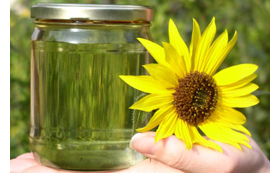
D-3 still cookin' with vegetable oil
District 3 is a powerful force, overseeing more than 2,550 state highway miles and a yearly maintenance budget of nearly $6.4 million. So when environmental concerns threatened to slow section activities to a crawl 14 years ago, some eggs over easy oiled the wheels of progress.
In 1997, then ITD regional storekeeper Fred Trescott - who retired in May 2008 after 24 years with ITD - had his usual breakfast. As he watched the two eggs slip around in the frying pan, he hit upon an idea that ITD still uses today. Because of regulations calling for the reduction of hazardous waste and materials, the department had stopped using diesel fuel to oil or clean maintenance equipment. However, no effective substitute had been found until Trescott's epiphany.
Steve Miller, then Special Crew foreman for the southwest Idaho office, was put in charge of finding a diesel fuel replacement.
 "Diesel was ideal because it was the only thing we found that would keep surfaces halfway clean so they would be usable," he said at the time. Cleaning the machinery by hand was taking a lot of time - time that could be better used on the job.
"Diesel was ideal because it was the only thing we found that would keep surfaces halfway clean so they would be usable," he said at the time. Cleaning the machinery by hand was taking a lot of time - time that could be better used on the job.
Miller experimented with more than a dozen alternative cleaners, including several high-powered asphalt release agents, but all were unsatisfactory. Some oiled the machinery efficiently, but wouldn't clean asphalt or other materials out of the truck beds used for hauling.
"We spent at least six months trying to come up with a suitable substitute," Trescott said. "Everyone had the 'Best in the West' but everything was so darned expensive."
Frustration was setting in. Remembering his breakfast moment, Trescott suggested vegetable oil. Miller, willing to try anything, ordered 10 gallons.
Temperature was the first obstacle. At colder temperatures, some products wouldn't work because they wouldn't spread and layer. If it was too hot, some products just evaporated.
The first trial was cold (65-70 degrees). Miller tried vegetable oil on the machinery tires the first day to keep them from sticking to the fresh asphalt. It worked about as well as diesel at that temperature. Miller tested it as a cleaner on the blade of a road grader. He used it on one grader blade and another product on a second blade. At the end of the day, the blade using vegetable oil was clean. Next, Miller tested the vegetable oil on a distributor bar. The hot bar evaporated all other agents, but the vegetable oil left a coating on the bar sufficient to make cleaning easy at the end of the day.
The Special Crew started using it as a truck bed cleaner. This too had excellent results. They sprayed the truck beds after each load, using just a thin stream directed at the top of the bed that ran down and coated the entire bed. Moreover, after using this process for some time, the crew only had to spray the beds once a day. The next week temperatures were above 100 degrees. The vegetable oil worked even better.
Miller said the process is similar to using vegetable oil on a cooking pan. The vegetable oil absorbs into the pores of the metal. Soon, less and less oil is needed to get the same results because a coating builds up, said Miller.
Because of this, vegetable oil has proven more cost-efficient the more often it is used. During testing, crews used a little more than two gallons of oil to coat a dozen 10-wheeler truck beds. They used about two gallons of vegetable oil per day on each road grader, spraying the tires and blades throughout the day. They initially used about two gallons per day on the distributor bar. Total volume of vegetable oil used decreased significantly, from 40 gallons to 25, after the first week.
Trescott's idea soon became a statewide department standard. Crews used vegetable oil on truck beds, asphalt distributors, even hand tools like rakes and shovels.
Dave Dansereau, current Southwest Idaho Special Crew foreman, said "We are still using the vegetable oil today, mostly for a pre-treatment to keep the asphalt from sticking."
Southeast Idaho crews also use vegetable oil.
Although Southwestern Idaho crews continue to use vegetable oil to coat machinery, for the past several years they have used a citrus-based product for cleaning that works well and also is environmentally friendly. Many of the other ITD regions have moved on from vegetable oil and are now using products called Slide, Slippery Wizard, orange-based cleaners and just good old-fashioned soapy water.
But it all started with eggs - over easy.
Published 3-18-2011